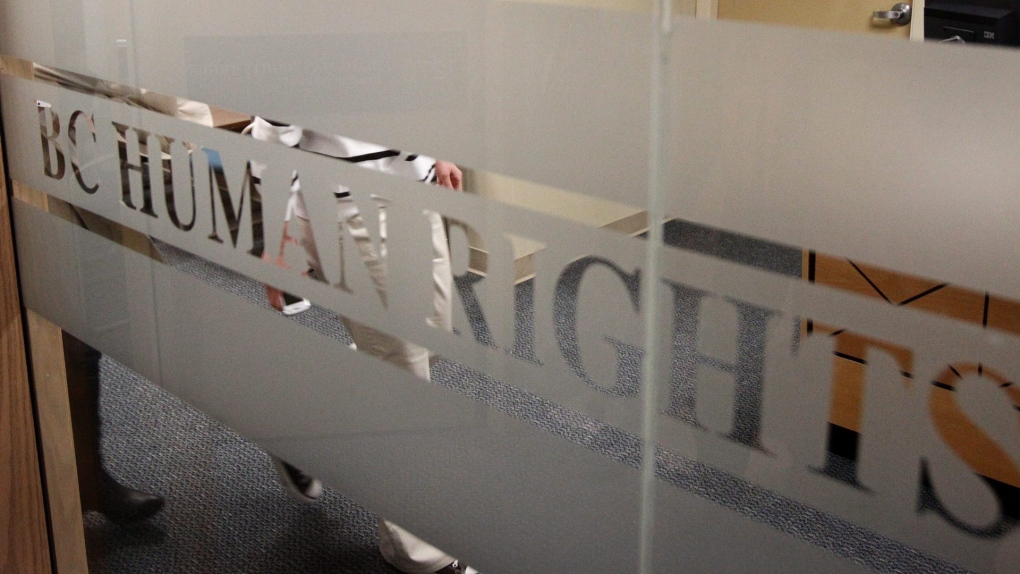B.C. tribunal orders $9,755 payout to taxi driver over caste-based discrimination
 A B.C. Human Rights Tribunal hearing room is shown in this file image from March 29, 2010. (THE CANADIAN PRESS/Darryl Dyck)
A B.C. Human Rights Tribunal hearing room is shown in this file image from March 29, 2010. (THE CANADIAN PRESS/Darryl Dyck)
The British Columbia Human Rights Tribunal has ordered that a taxi driver be paid more than $9,000 in compensation because his caste was insulted during a physical altercation at a staff Christmas party.
The tribunal's March 15 decision said Manoj Bhangu, an immigrant from Punjab in India, was discriminated against by two co-workers on the basis of his ancestry, place of origin and race.
Tribunal adjudicator Sonya Pighin said brothers Inderjit and Avninder Dhillon used a caste-based slur against Bhangu during the brawl at the B.C. firm's 2018 party and ordered that they pay him $9,755.81 in compensation.
Pighin said in the decision that although she couldn't conclude the brothers regarded Bhangu as their inferior, he had nevertheless proven his “protected characteristics” were a factor in the adverse psychological impacts he suffered.
The slur referred to a subgroup of the Dalit caste, Pighin said in the ruling, citing a submitted report that Dalits were traditionally “given demeaning names and jobs to ensure they realized their lowest position in society.”
She ruled that the relative position in the caste system of the person who uttered the slur did not matter; what mattered was whether that person belonged to the slurred caste.
“It is the use of the slur by a person who is not a member of the slur caste that gives the use of the slur the insulting or humiliating connotation,” read the ruling.
She said Bhangu provided uncontested evidence that he experienced shock and embarrassment after the incident and described it as difficult for him to explain to his children what happened.
“He also found it very difficult to go to work and interact with his colleagues who had observed the events at the staff party because he felt insulted and humiliated in front of them and being around them reminded him of what had happened,” Pighin wrote in the decision.
The decision also said that the insult reminded Bhangu of caste discrimination he suffered while growing up in India, which was part of the reason he moved to Canada.
Pighin said that although the discrimination Bhangu suffered during the altercation was brief, its impact was exacerbated because it involved violence.
“Mr. Bhangu was not in a position of powerlessness in relation to the respondents. However, his history of caste-based discrimination in India intensified the severity of the impact he experienced regarding the discrimination,” read the decision.
Pighin ordered Inderjit and Avninder to jointly pay $3,755.81 to Bhangu for expenses he incurred in relation to the discrimination and also ordered the brothers to pay another $6,000 to compensate for the injury to his “dignity, feelings and self-respect.”
India's caste system dividing Hindus was officially abolished in 1950, but the social hierarchy still pervades many aspects of life there.
The system divided Hindus into four main categories, deciding what jobs they could do and who they could marry.
Bhangu accused a third person of using the slur, but the complaint was dismissed.
This report by The Canadian Press was first published Mar. 27, 2023.
This story was produced with the financial assistance of the Meta and Canadian Press News Fellowship.
CTVNews.ca Top Stories

Tensions rising between Canada Post, union as strike nears four-week mark
Canada Post and the union representing postal workers are in a war of words as a countrywide strike enters its 27th day.
BoC widely expected to cut interest rates today, odds leaning toward half-point cut
The Bank of Canada is set to make its final interest rate announcement of the year this morning.
Conservatives still in majority territory, despite Liberal affordability measures: Nanos
The Liberals' promise of a temporary GST break and $250 rebate cheques haven't benefited Prime Minister Justin Trudeau and his minority government when it comes to public support, according to Nanos Research data.
Luigi Mangione shouts as he is led into courthouse where he contests extradition to N.Y.
The suspect in the killing of UnitedHealthcare’s CEO struggled with deputies and shouted Tuesday while arriving for a court appearance in Pennsylvania, a day after he was arrested at a McDonald’s and charged with murder.
What financial experts wish you knew about divorce
Divorce is a major financial reset, yet also one of the worst times to make a lot of important decisions, according to financial experts.
'They thought he wasn't making it': B.C. soccer star's family on his shocking shooting — and remarkable recovery
Born and raised in Metro Vancouver, Nathan Demian was living his dream playing soccer for top-ranked Ohio State University, when he was shot during a post-game pizza run with his brother Saturday night.
MPs approve $21.6B in supplementary spending; Conservatives vote against
Parliament has approved $21.6 billion in government spending, in a late Tuesday vote in the House of Commons.
Dolly Parton explains why her longtime husband doesn't attend events with her
Dolly Parton has been married for 58 years, but you probably could count on one hand the times you have seen her with her husband.
Trudeau set to speak with premiers to tackle Trump's tariff plan
Prime Minister Justin Trudeau is set to meet with provincial and territorial premiers this afternoon to talk Canada-U.S. relations.

































